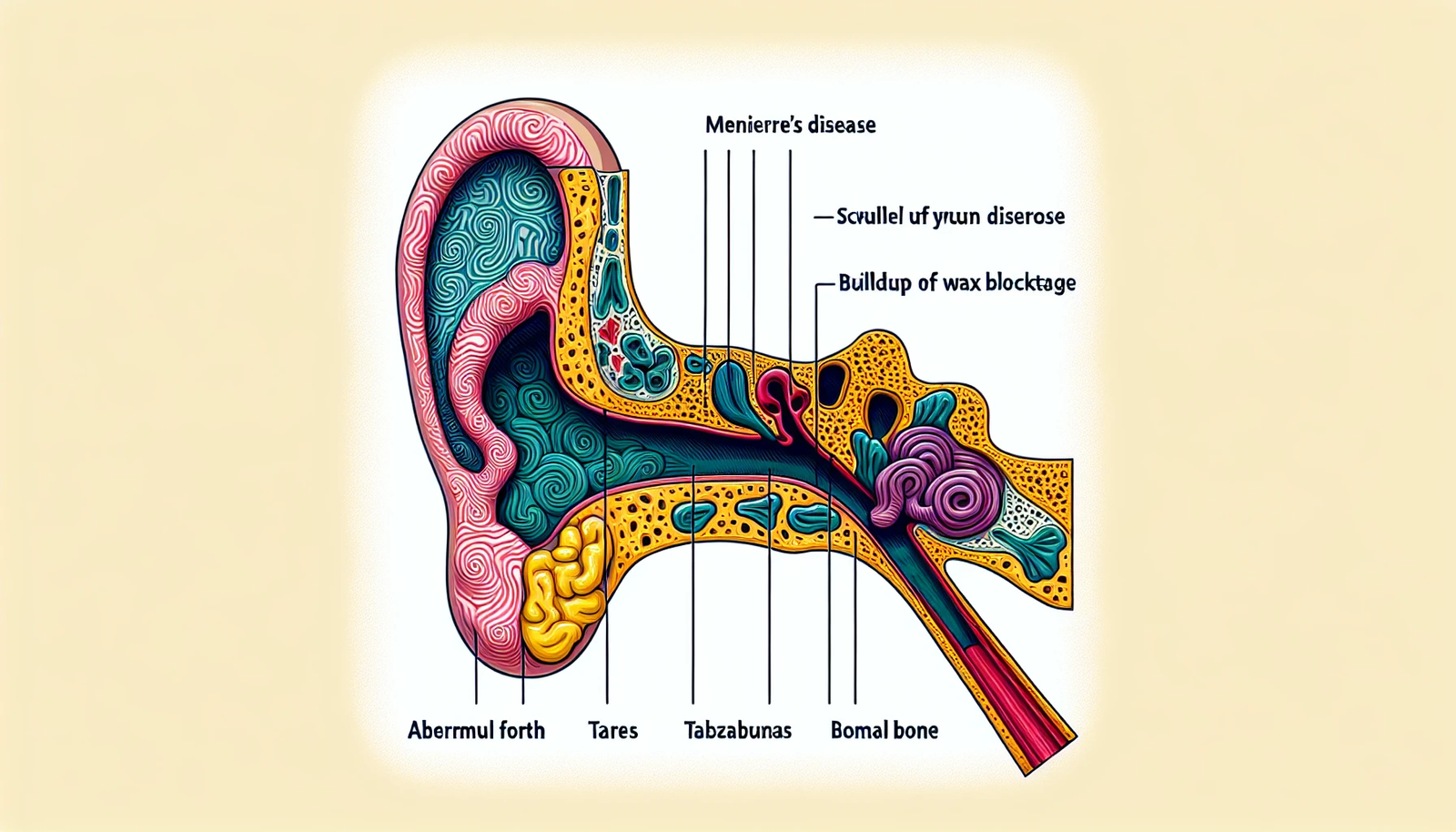Do you ever experience a constant ringing, buzzing, or hissing sound that seems to come from nowhere? If so, you might be experiencing tinnitus, a common hearing condition that affects millions of people worldwide. While it might seem like an elusive and mysterious illness, understanding the basics of “what is Tinnitus” can help you manage its symptoms and improve your quality of life.
Key Takeaways
Tinnitus is a perception of sound without an external source, often linked to age-related hearing loss and other factors.
Diagnosis typically involves taking a detailed medical history, conducting hearing tests, having imaging studies and consulting specialists.
Treatments include sound therapy, Tinnitus Retraining Therapy (TRT), lifestyle adjustments such as reducing stress or protecting the ears from loud sounds and innovations in tinnitus research.
Exploring the Basics of Tinnitus

The experience of sound when no external source exists is referred to as tinnitus, and while it has been associated with age-related hearing loss, the exact causes remain largely unknown. Repeated exposure to loud sounds often leads to this condition. Thus, excessive earwax can Aggravate or even cause such situations. Brief periods spent in proximity of extremely noisy environments may result in permanent auditory difficulties which oftentimes are accompanied by a ringing or buzzing sensation within the ears too. Both high blood pressure and regular alcohol consumption (specifically among individuals experiencing inner ear issues) play their part in developing various levels of hearing impairment linked with tinnitus.
The Typical Sounds of Tinnitus
Tinnitus can manifest with different levels of sound and duration, for one ear or both. In some cases it could indicate an acoustic neuroma- a rare nonmalignant tumor. It is important to seek medical advice when experiencing tinnitus along with symptoms such as pulsatile noise (ticking in rhythm), hearing loss, vertigo/dizziness, ache or pressure in the ears. Altered vision or balance may also accompany these signs too.
To manage tinnitus people should be conscious of making lifestyle changes like eating well, getting regular exercise, ensuring quality sleep and reducing stress. For those already diagnosed, they might look at treatment strategies for associated problems: depression anxiety insomnia pain etc. To avoid Damage from exposure to loud noises, either at home or work, consider using suitable protective devices – earmuffs & plugs which will help reduce the risk factors connected to developing this condition.
Subjective vs Objective Tinnitus
Two kinds of tinnitus exist: subjective and objective. Subjective, experienced only by the individual, is opposed to objective, which can be heard by other people. It has been proposed that problems concerning blood vessels or muscle spasms will occur. To irregular growths within the middle ear may cause cases of objecitve tinnitus.
For treating subjects with subjectively perceived symptoms, methods such as sound therapy or Tinnitis Retraining Therapy are used while strategies like lifestyle changes – reduced stress levels for instance- along with using hearing aids tend to help those who suffer from objectively sensed ones due to its physical origin being different compared to any form of mental one.
The Underlying Causes of Tinnitus

The causes of tinnitus may include hearing loss, injury to the inner ear, and conditions or ailments that influence either auditory nerves in the ears or brain. Certain medications such as antibiotics, cancer drugs, diuretics, and certain antidepressants can cause worsening symptoms. Addressing these underlying issues has been proven to improve tinnitus while noise-masking treatments are known to lessen its impact on your life.
Inner Ear Damage and Hearing Loss
Loud noises can be damaging to the inner ear and cause hearing loss that may manifest itself in tinnitus. Repeated exposure or a single loud noise incident over an extended period of time can lead to hair cell damage within the ear which could create abnormal neuronal activity in auditory centers of the brain, resulting in an inner ear disorder. Causes for this condition include prolonged exposure to sound, age-related factors, and Ménière’s disease, all leading to hearing impairment associated with ringing sounds from tinnitus.
Medical Conditions and Ear Disorders
Tinnitus is a condition that can manifest in the form of hearing loss, vertigo, and a sensation of pressure inside one’s ear. There are several medical conditions which may be responsible for tinnitus or aggravate its symptoms including Meniere’s Disease as well as an obstruction caused by wax buildup. Allergies too can cause difficulties with regards to the tubes connecting ears to throat. Resulting in an increased intensity of tinnitus symptoms. It becomes essential to treat allergies appropriately so that issues connected with this disorder diminish over time.
Diagnosing Tinnitus: What to Expect

When it comes to diagnosing tinnitus, a detailed medical history is essential. A hearing test should be conducted as well, and imaging studies may also be necessary. Patients are advised to consult with primary care doctors, ENT specialists or audiologists for an accurate diagnosis from a specialist in the condition.
Questions that might come up during the examination include how severe this sound is affecting you, what your specific experience of tinnitus sounds like, when first noticed. Any changes in one’s sense of hearing ; exposure to loud noises or head/neck trauma, plus potential underlying illnesses and medication intake related to ringing in ears issues.
As such, being examined by someone who has expertise on tinnitus would allow for comprehensive evaluation which provides more precise results than relying solely on one’s own accountability about its symptoms.
Effective Treatment Options for Tinnitus Relief

For people experiencing tinnitus, managing their symptoms and improving quality of life can be achieved through a combination of interventions. Sound therapy has been proven to provide relief from the effects by utilizing external noise manipulation in order to change one’s perception or reaction towards tinnitus. For greater success, it is often combined with Tinnitus Retraining Therapy (TRT). This form of treatment involves counseling as well as sound therapies that are designed specifically for each patient according to an agreed upon protocol which aims at decreasing any irritation brought on by daily living due to suffering from this disorder. Hearing aids also offer another beneficial option when attempting long-term symptom management.
Sound Therapy and Environmental Sounds
Sound therapy is an approach utilized for the management of tinnitus, by using external sounds to mask or divert attention from the ringing and buzzing noises. This method provides a peaceful auditory environment that can assist in reducing tinnitus’ effect on everyday life. Such techniques include: Tinnitus Maskers, white noise, waves crashing against shorelines, and rain falling softly. All these calming ambient sounds may help with decreasing symptoms associated with this condition.
Studies suggest sound therapy has been beneficial in diminishing distress caused by continuous ringing/buzzing and its strength within certain individuals – although randomized control trials haven’t yet confirmed any precise effectiveness rates regarding it use as treatment option for underlying medical issue(s). Although it won’t cure your ailment completely nor stop damage, soundtherapy could certainly be used to reduce intensity of audible phenomena significantly over time & ease psychological burden inflicted due to said symptom.
Tinnitus Retraining Therapy (TRT)
Tinnitus Retraining Therapy (TRT) is a form of treatment used to help re-condition the brain, utilizing counseling and sound therapy. It’s composed of one-on-one counsel sessions as well as instruction about tinnitus and fitting/utilization of special generators designed for managing this condition.
A good candidate would be someone with moderate or extreme levels of hearing impairment that can benefit from some amplifying device use along with being open minded towards Tinnitus focused counseling plus music based treatments.
The Role of Hearing Aids
Hearing aids are an effective means of reducing the severity and prevalence of tinnitus, due to their ability to increase external sound levels. This in turn can reduce stress by making it easier for sounds (particularly speech) to be heard clearly. It’s important that hearing aids aren’t seen as a cure-all. They cannot eradicate tinnitus, but rather add extra noise to the existing symptoms.
Several different varieties exist such as Widex Moment, Cochlear implants or Oticon with Tinnitus SoundSupport from Phonak Audéo Lumity and Nada Paradise through Signia Pure’s Genesis AI offering plenty of options when considering appropriate treatment plans. Research has indicated positive results following six months use within digital hearing aid models, resulting in clinically significant reductions regarding those suffering from the condition concerned.
Lifestyle Adjustments to Manage Tinnitus

When it comes to managing tinnitus symptoms and avoiding damage, some lifestyle adjustments are necessary. For instance, ear protection from loud sounds can help reduce the severity of these effects. Other elements that tend to make this condition worse include smoking, lack of sleep or high levels of stress – especially in regards to tobacco use, which decreases oxygen supply towards the ears’ cells as an added risk factor for worsening tinnitus related matters.
To properly address such issues, there are a few relaxation techniques able to bring relief: Progressive muscle relaxation, yoga exercises and deep breathing practices, and lastly methods designed for better management of any existing stress could also prove very effective against tackling signs associated with this condition since they have been seen promoting positive alteration on hormones & neurotransmitters impacted by anxiety/tension linked problems like buzzing noises within one’s ears. Controlling mental stresses is key when trying to ease discomfort brought about through affliction-related ringing tones noticed inside human hearing organs.
Stress Reduction and Relaxation Techniques
Relieving tinnitus-related distress can be accomplished through daily activities, such as walking, yoga and meditation. These techniques reduce stress, which in turn may help manage the symptoms of this condition. Deep breathing assists with relaxation by calming the nervous system while potentially providing relief from discomfort associated with tinnitus.
Mindfulness practices like mindfulness meditation have been confirmed to aid in reducing anxiety levels for those who are suffering from it. Thus helping improve their overall wellbeing too! Regularly incorporating these methods into your routine should assist you in relieving tension and stress caused due to tinnitus thereby giving better control over its effects on yourself or a loved one experiencing it.
Protecting Your Ears from Loud Sounds
To avoid tinnitus, it is essential to invest in reliable ear protection from loud sounds. High-fidelity (musician’s) earplugs can be very useful for this purpose as they reduce the noise that reaches your ears through offsetting sound waves. Noise cancelling headphones may also offer some relief from existing tinnitus, but responsible use of these should still be maintained and one shouldn’t expose themselves to excessively high volumes over long periods of time since this could lead to Worsening the condition.
Innovations in Tinnitus Research
Recent advances in tinnitus research are quite remarkable as they involve innovative treatments like personalized bi-sensory stimulation and the exploration of root causes using high tech neuroimaging. A FDA approved device has been created for those suffering from this condition along with bisensory treatment that involves headphones fitted internally paired with externally attached electrodes. As research continues to progress, we anticipate more effective solutions while deepening our understanding of tinnitus and its complex effects on individuals.
Summary
To wrap it up, tinnitus is an intricate auditory issue that affects millions of people across the globe. It’s important to comprehend its reasons for existing, signs and treatments with a view to manage the condition while boosting quality of life among those affected. Strategies such as lifestyle modifications or tech advancements can help lessen symptoms associated with this hearing disorder and prevent damage in one’s ears too.
Being informed on current research data along with accessible treatment options will empower you when confronted with tinnitus. Help you live more cheerfully without any limitations due to your condition! Do not forget: You are never alone while living through these moments, knowledge plus suitable support has got you covered in confronting challenges imposed by Tinnitus Symptoms.
Frequently Asked Questions
What are the main causes of tinnitus?
The primary reasons for tinnitus are suspected to be exposure to loud noises, neck or head trauma, ear infections, cardiovascular issues and specific medicines.
Do tinnitus go away?
Tinnitus is a long-term disorder with no known remedy. Methods to minimize its effects exist. To make the most of these treatment options and manage symptoms better, it’s important for sufferers to stay informed about this condition so they can identify techniques that work best in decreasing their sensitivity to noises made by tinnitus. Various strategies may be employed which will enable those living with tinnitus to decrease or ignore completely any sounds associated with it.
What is the best way to deal with tinnitus?
One way to combat tinnitus is by looking into treatments such as hearing aids, cochlear implants, maskers, drugs and counseling. To this option, there is also the possibility of trying out a process called tinnitus retraining therapy, which involves relaxation techniques too. With all these avenues available, it can help you find some level of comfort from your condition.
How is tinnitus cured?
There is no known cure for tinnitus. Certain treatments such as sound therapy devices or hearing aids may offer relief. Behavioral therapies and medications can be beneficial in decreasing symptoms too. Reducing stress levels with relaxation practices might also help individuals cope better with the condition.
What are the common characteristics of tinnitus?
Tinnitus is an auditory sensation which may manifest in the form of a ringing, buzzing, hissing or humming noise and can range from slight to unbearable. This sound might be heard only on one side or both ears, either all the time or sporadically.

